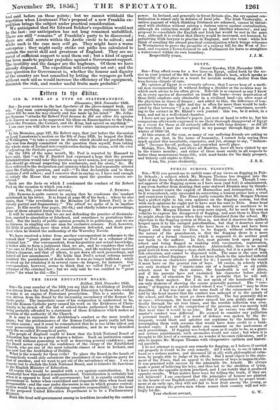PUBLIC SCHOOL FLOGGING.
SIR—Will you permit me to unfold some of my views on flogging in Pub- lic Schools ; a subject which Mr. Morgan Thomas has dragged into the light of day from the darkest shades of the Etonian closet. Though I can- not approve of the flogging system as I have seen (and felt) it administered, I am even further from desiring that some stalwart Etonian may by thrash- ing his master renew the exploit of Harmodius and Aristogeiton ; which, be it remembered, only succeeded in converting a lenient prince into a cruel and suspicious tyrant. The Times justly remarks that Mr. Morgan Thomas had a perfect right to his own opinions on the flogging system, but that with such opinions he ought not to have sent his sons to Eton. Some head masters have been accused of looking on boys merely as machines to be flogged : Mr. Morgan Thomas is even more unjust, i for he used h sons as vehicles to express his disapproval of flogging, and sent them to Eton that he might abuse the system when they were dismissed from the school. My objection to the flogging system at Eton is, not that it deserves the epithets heaped upon it by the enraged paterfamilias but that it deserves none of them. 'Die reason why fathers who have 'been to Eton and have been flogged send their sons to Eton to be flogged, without reflecting on the nature of the punishment, is that the flogging there is a mere ceremony of a formal character, which is supposed to do neither good nor harm to the sufferer. In fact, most parents look upon going to school and being flogged as ranking with vaccination, registration, and putting on a clean shirt on Sunday. Abstractedly, there is no moral good derived from wearing a clean shirt on Sunday, but it is a point of Eng-
lish and cannot be dispensed with. The same is the case with most public school floggings. I do not here allude to the mischief inflicted by the system on characters unfitted for it ; I merely allude to the result it must have on the general run of boys. Of course in schools ich are only destined for "ninety-nine out of a hundred," ls d," as all public schools must be by their nature, the hundredth is out of place, and if his parents have not examined his character before select- ing a mode of education for him, it is probable that he will suf- fer from their neglect. But I do not speak of the hundredth boy ; I am only desirous of showing the course generally pursued. The " cere- mony " of flogging at a public school where I was " educated " may be thus described. A boy was sent up for some fault of the commonest : he was told by the head master that his conduct was unheard of in the annals of the school, and that he must go down directly. The boy generally did so at once ; whereupon, the head master swayed his arm gently and majes- tically through the air four times, and the terrible infliction was over. Once a boy laughed at the completion of the process, and was merely told that next time it would be no joke. But if an excuse was offered the mastees conduct was different. He seemed to consider any palliation a personal insult ; and if a word of defence was spoken by the de- linquent, would blurt and splutter out sophisms by the hundred, in- termingling them with screams that would have done credit to a bald- headed eagle. I need hardly make any comment on the uselessness of such proceedings. If flogging was looked upon as it ought to be, as a grave and serious punishment, such anomalies would not exist,• but when it is brought to the level of a ceremony, no wonder it becomes ridiculous, and is able to inspire Mr. Morgan Thomas with vituperative epithets and histori- cal parallels. I do not attempt to suggest any remedy for flogging, as I believe if carried out properly it would be its own remedy. All I wish is, to see it taken in hand as a serious matter, and discussed (if at all) with philosophical calm- ness, by people able to judge of its effects. But I must object to the state- ment of the Times, that an appeal to the honour of boys is imp_racticable. It was practised with success by the admirable Dr. Arnold. He always made a point of believing his boys, and thus led to the abolition of lying. I have seen the opposite system practised, and I can testify that it produced opposite results. What motive have boys for telling the truth, if they are not believed ? I am convinced that the principles of honour are planted in the hearts of our English youth ; and that if stimulated by proper treat- ment at an early age, they will not fail to bear fruit among the young, as they have among the grown men whose names their country will not wil- lingly let die.


























 Previous page
Previous page